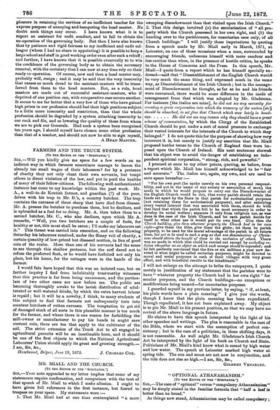FARMERS AND THE TRUCK SYSTEM.
[To MR EDITOR 01 TEl "SPECTATOR."] SIR,—Will you kindly give me space for a few words on an indirect way in which farmers sometimes manage to lessen the already too small wages of their labourers? for by a pretence of charity they not only cheat their own servants, but tempt others to direct violation of the law, and put in peril the healths of many of their fellow-citizens. The following well-authenticated instance has come to my knowledge within the past week. Mr. A., a well-to-do Kentish farmer, and guardian (?) of the poor, drives with his trap to Mr. B.'s, a country butcher. The trap contains the carcases of three sheep that have died from disease. Mr. A. presses the butcher to purchase them, but he declines, and is upbraided as a fool for BO doing. Mr. A. then takes them to a second butcher, Mr. C., who also declines, upon which Mr. A. remarks, "Well, you two butchers are a couple of fools, for healthy or not, this meat shall be eaten ; 111 make my labourers eat it." This threat was carried into execution, and on the following Saturday his labourers received, under the flimsy veil of charity, a certain quantity of low-priced but diseased mutton, in lieu of good coin of the realm. More than one of his servants had the sense to see through this shallow pretence, but the serf dared not to refuse the proferred flesh, or he would have forfeited not only his place, but his home, for the cottages were in the hands of the farmer.
I would fain have hoped that this was an isolated case, but on farther inquiry I find from indubitably trustworthy witnesses that this practice is far from being uncommon, and the particu- lars of two other cases are now before me. The public are becoming thoroughly awake to the lavish distribution of adul- terated or well-watered drinks, by which the extra harvest labour is repaid ; bat it will be a novelty, I think, to many students of this subject to find that farmers not infrequently turn into amateur butchers of rotten carcases. The temptation to get rid of damaged stock of all sorts in this plausible manner is too much for the farmer, and where there is one reason for forbidding the mill-owner or manufacturer to pay his hands in aught save current coin, there are ten that apply to the cultivator of the soil. The strict extension of the Truck Act to all engaged in agricultural pursuits will be an inestimable boon, and it should be one of the first objects to which the National Agricultural Labourers' Union should apply its great and growing strength.— I am, Sir, &c., Hazelwood, Belper, June 19, 1872. J. CHARLES COX.


































 Previous page
Previous page